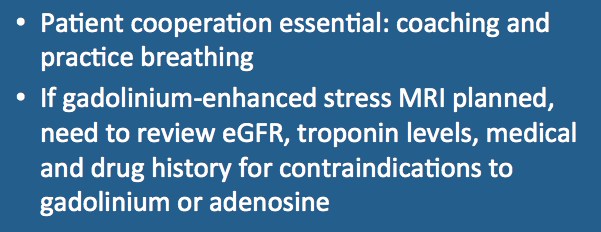Cardiac MRI exams are among the most difficult of all MR studies to perform well. They require not only a top-notch team of experienced physicians, technologists, and nurses, but cooperation of the patient to obtain the highest quality images.
Patients need to understand the importance of holding their bodies still during the examination, a challenging task in that many CMR exams take more than an hour to complete. They must be coached at being consistent in their breath-holding patterns and given practice with suspended respiration before being placed in the scanner. For most patients holding their breaths in expiration ("breathe in...breathe out...hold it") will lead to a more consistent position of the diaphragm and is the preferred method. A minority of patients may find this difficult or uncomfortable and suspension in inspiration will therefore need to be used.
In addition to routine safety screening and questioning about allergies, several additional preparations are required if a dynamic, gadolinium-enhanced stress perfusion MRI is to be performed:
- Renal function testing. Because of the risk of nephrogenic systemic fibrosis, gadolinium cannot be given safely to patients with severe renal disease and should be administered in reduced dosage for patients with renal insufficiency. If there is any suspicion of renal disease a recent estimated glomerular filtration rate (eGFR) should generally be obtained by serum blood test prior to gadolinium administration.
- Cardiac troponin testing. Cardiac troponins are enzymes released by damaged myocardium. As pharmacological stress testing is generally contraindicated after a recent myocardial infarction, measurement of serum troponins should be performed in the appropriate clinical setting.
- Medical history review. In addition to recent myocardial infarction, pharmacological stress testing may be contraindicated in patients with acute myocarditis/pericarditis, progressive unstable angina, rapid arrhythmias, 2nd or 3rd degree AV block, and other disorders. Questioning the patient about reactive airway disease should always be performed, as regadenoson (Lexiscan) would likely be preferred over adenosine in this clinical scenario.
- Informed consent. Pharmacological stress testing confers additional rare but significant risks to the patient, including myocardial infarction, arrhythmias, seizures, stroke, and even death. Hence a formal signed consent and discussion with the patient is required.
- Start 2 IVs. Gadolinium and adenosine cannot be given through the same line, so two separate IVs are required. Separate lines are optional if regadenoson or dobutamine are used.
- Avoidance of stimulants. Patients should be advised not to consume stimulants such as coffee, tea, caffeinated sodas, energy drinks, and chocolate within 12-24 hours of the scan. These can interfere with the efficacy of the pharmacological stress testing and interpretation of the examination.
Finally, establishing a good EKG tracing is essential for obtaining high quality CMR images. Techniques for achieving this are described in the next two Q&A's.
References
America Society of Nuclear Cardiology. Pharmacologic and exercise stress tests, 2011:1-3. From www.asnc.org/practicepoints, accessed 2/2015
Patil H, Vaidya O, Bogart D. A review of causes and systemic approach to cardiac troponin elevation. Clin Cariol 2011; 34:723-728.
America Society of Nuclear Cardiology. Pharmacologic and exercise stress tests, 2011:1-3. From www.asnc.org/practicepoints, accessed 2/2015
Patil H, Vaidya O, Bogart D. A review of causes and systemic approach to cardiac troponin elevation. Clin Cariol 2011; 34:723-728.
Related Questions
We often have trouble getting a clean EKG signal for cardiac gating. Any helpful hints?
We often have trouble getting a clean EKG signal for cardiac gating. Any helpful hints?
